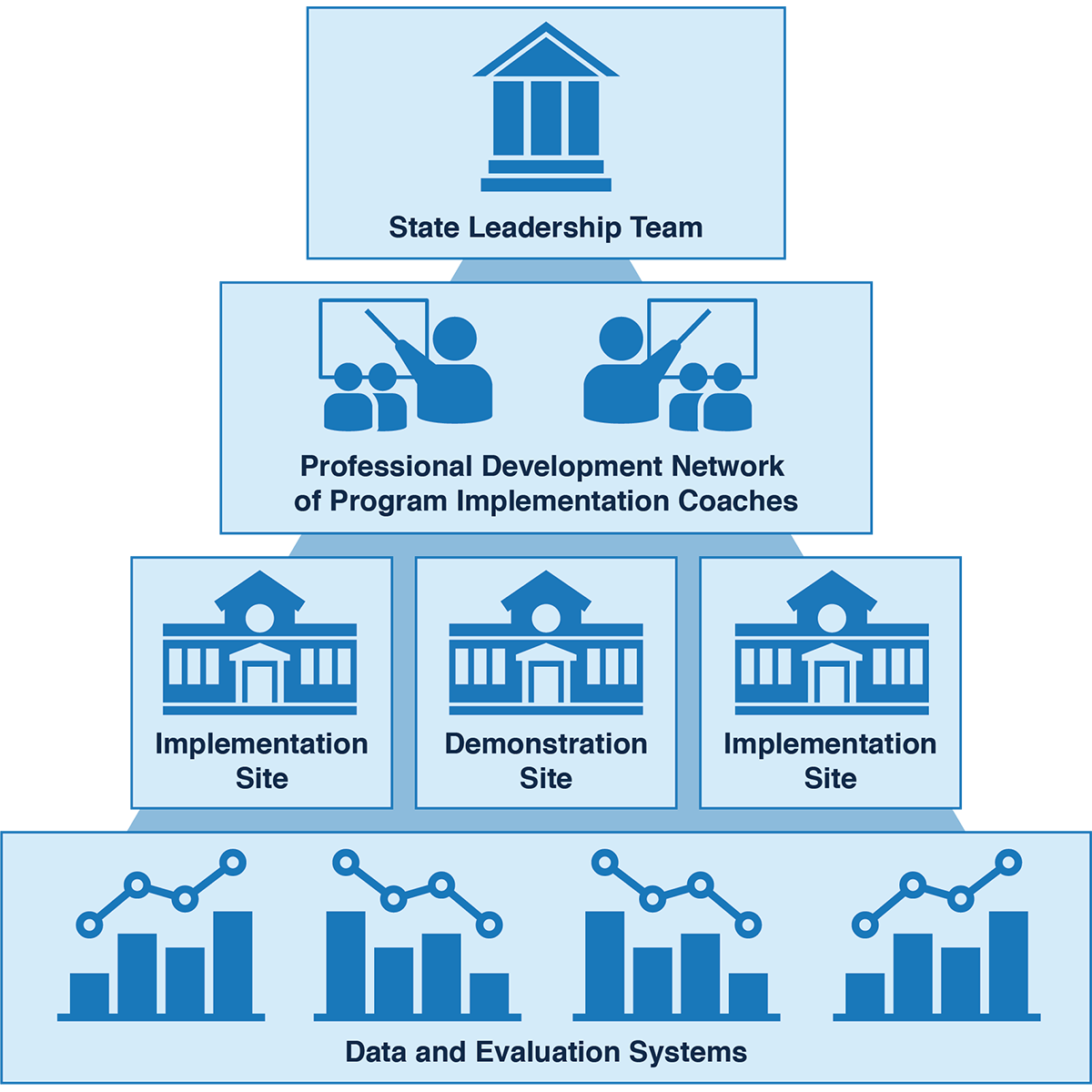Early Childhood Implementation Snapshots, No. 1: Four Essential Support Structures for Statewide Implementation
- updated January 31, 2025
- by Sherri Britt Williams
The Stages of Implementation mark the process and progress of a state system’s implementation of evidence-based practices by outlining critical activities at key points, or stages, in the implementation process. As these stages are interactive, and not linear, state systems can support movement and increase fidelity by establishing four essential support structures:



- A State Leadership Team plans and guides the stages of implementation, and ensures supports and resources are available.
- A Professional Development Network of Program Implementation Coaches provides training, guidance, and ongoing support to programs to increase understanding and application of evidence-based practices with fidelity.
- Implementation Sites and Demonstration Sites put the evidence-based practices into action.
- Data and Evaluation Systems are tools and procedures that collect data across structures, document fidelity, and inform decision-making.
By establishing these essential support structures, states assure that support and resources are in place to implement, sustain, and scale-up initiatives and increase fidelity.
Resource Spotlight
The Statewide Implementation Guide provides a list of key resources and tools to help state systems build and enhance each of the four essential support structures. The list is arranged by essential support structure and includes guidance, considerations, self-assessments and useful document templates.
Voices from the Field: North Carolina

This video explains how the North Carolina-Early Learning Network (NC-ELN) provided capacity-building support to NC Office of Early Learning by addressing each of the four essential support structures and using those structures to systematically provide leadership, training, practice application support, and data-driven decisions.
Dawn Meskil, Co-Coordinator of NC's IDEA Part B Section 619 Preschool Exceptional Children Program at the NC Office of Early Learning, attributes the success of NC's Pyramid Model implementation and sustainability to establishing the four essential support structures:
"By developing a well-organized, supportive structure for statewide implementation in this way, we are able to support, sustain, and scale up Pyramid implementations in North Carolina to improve child outcomes for Pre-K children with disabilities and to increase opportunities for access to high quality, inclusive environments for all children."

Considerations
- Representation on leadership and implementation support teams for each essential support structure strengthens your decision-making and implementation. Include people with direct knowledge of and experiences within the families and communities you serve so they can help you recognize gaps and barriers in the system.
- Data collection and transparent discussions can identify underserved children with disabilities, for example, those in rural communities. Create a data-driven process for identifying all potentially eligible children.
- Strong partnerships between professionals and the families and communities they serve are supported when you consider their unique contexts.
References
- Statewide Implementation Guide. (2019). ECTA Early Childhood Technical Assistance Center. https://ectacenter.org/sig
- Williams, S.B., & Williams, C. (2020). Implementing a statewide system of support for preschool social and emotional learning through FPG's NC Early Learning Network project [Seminar]. UNC Chapel Hill. https://nceln.fpg.unc.edu/ncppmresources
The contents of this page were developed under cooperative agreements from the U.S. Department of Education, #H326P17001 (ECTA Center), and #H326B170003 (NCPMI), from the Office of Special Education Programs, U.S. Department of Education. However, these contents do not necessarily represent the policy of the U.S. Department of Education, and you should not assume endorsement by the Federal Government.

